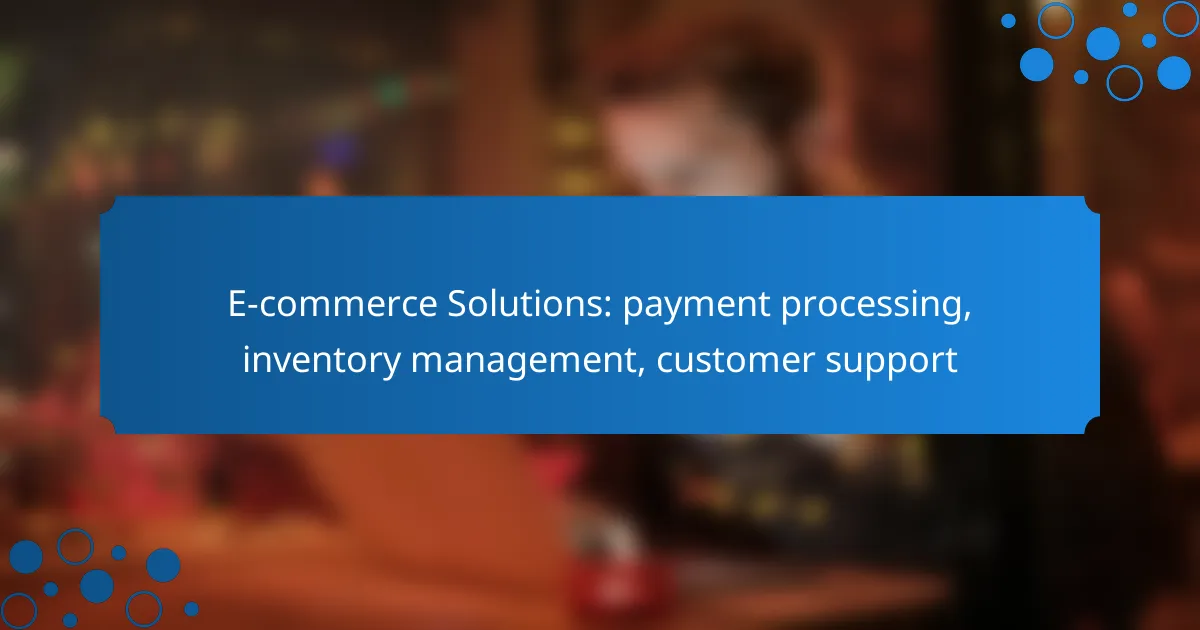E-commerce solutions play a crucial role in enhancing online business operations, particularly in payment processing, inventory management, and customer support. Effective payment processing systems offer features like multi-currency support and seamless integration, while robust inventory management tools ensure optimal stock control and order processing. By selecting the right solutions, businesses can improve efficiency, reduce costs, and elevate customer satisfaction.

What are the best e-commerce payment processing solutions in New Zealand?
The best e-commerce payment processing solutions in New Zealand include options that cater to local businesses, offering features like multi-currency support, ease of integration, and competitive fees. Selecting the right solution depends on your business size, transaction volume, and specific needs.
Stripe
Stripe is a popular choice for e-commerce businesses in New Zealand due to its robust API and extensive feature set. It supports various payment methods, including credit cards and digital wallets, and offers seamless integration with numerous e-commerce platforms.
Consider Stripe if you need advanced features like subscription billing and international payments. Its fees are typically around 2.9% plus NZD 0.30 per transaction, making it competitive for online sales.
PayPal
PayPal remains a widely used payment processor in New Zealand, known for its ease of use and brand recognition. It allows customers to pay using their PayPal balance, credit cards, or bank accounts, which can increase conversion rates.
When using PayPal, be aware of transaction fees, which generally range from 2.6% to 3.6% plus a fixed fee based on the currency. Its buyer protection policies can also enhance customer trust in your e-commerce site.
Square
Square is an excellent option for small to medium-sized businesses looking for an all-in-one payment solution. It offers point-of-sale systems alongside online payment processing, making it versatile for businesses with both physical and online presence.
Square charges a flat rate of around 2.6% plus NZD 0.10 per transaction for online payments. Its user-friendly interface and comprehensive dashboard for sales tracking can simplify your financial management.
Adyen
Adyen is a powerful payment processor that caters to larger businesses with global operations. It provides a unified platform for managing payments across multiple channels, including online, mobile, and in-store.
Adyen’s pricing model is customized based on transaction volume and business needs, which can be beneficial for high-volume merchants. Its support for various payment methods and currencies makes it suitable for businesses targeting international customers.
Payment Express
Payment Express is a local payment gateway that offers tailored solutions for New Zealand businesses. It supports a wide range of payment methods and provides features like fraud protection and reporting tools.
With competitive pricing and a focus on local customer support, Payment Express is ideal for businesses that prioritize a strong connection with their payment processor. Fees typically start around 1.5% per transaction, depending on the service package chosen.
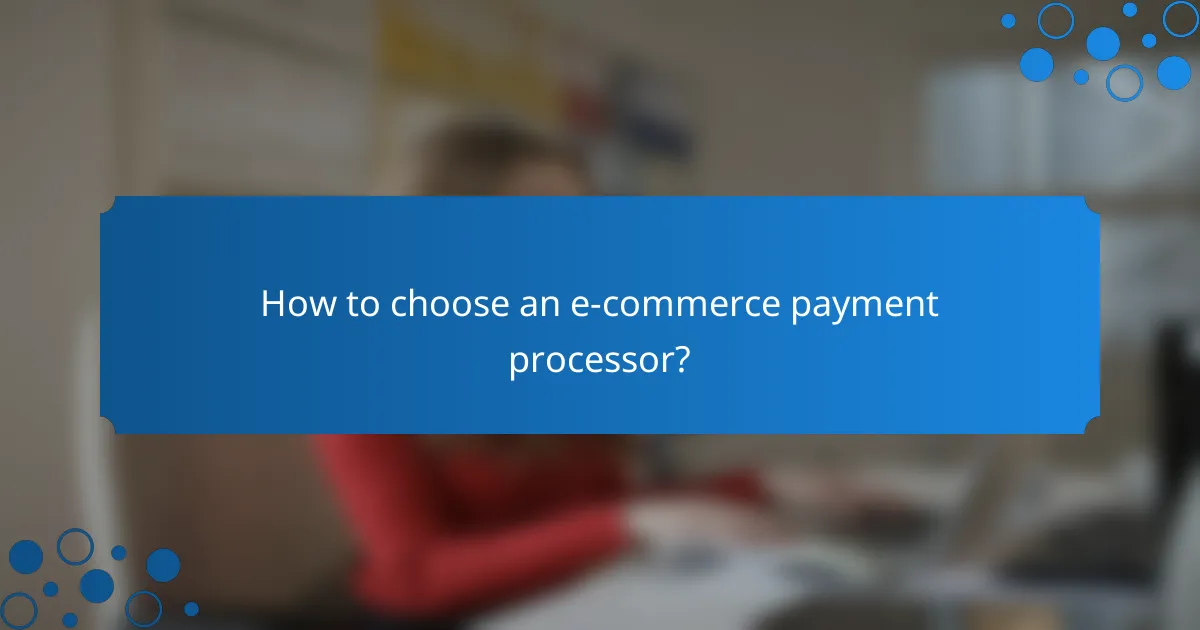
How to choose an e-commerce payment processor?
Choosing an e-commerce payment processor involves evaluating factors such as transaction fees, integration capabilities, and supported payment methods. A suitable processor will enhance your online sales experience while minimizing costs and technical challenges.
Transaction fees
Transaction fees can significantly impact your profit margins, so it’s essential to understand the fee structure of each payment processor. Most processors charge a percentage of each sale, typically ranging from 1.5% to 3.5%, plus a fixed fee per transaction, which can be around $0.10 to $0.30. Look for processors that offer transparent pricing and no hidden fees.
Consider whether the processor charges monthly fees or setup costs, as these can add to your overall expenses. Some providers may offer tiered pricing based on sales volume, which might be beneficial as your business grows.
Integration capabilities
Integration capabilities determine how easily a payment processor can connect with your e-commerce platform. Ensure the processor supports popular platforms like Shopify, WooCommerce, or Magento, as this will simplify setup and maintenance. Look for processors that offer plugins or APIs for seamless integration.
Additionally, consider the level of technical support provided during integration. A processor with robust documentation and responsive customer service can save you time and frustration during the setup process.
Supported payment methods
Supported payment methods are crucial for catering to a diverse customer base. Ensure the processor accepts major credit and debit cards, as well as alternative payment options like digital wallets (e.g., PayPal, Apple Pay, Google Pay). This flexibility can enhance customer satisfaction and reduce cart abandonment rates.
Check if the processor supports international payments, especially if you plan to sell globally. Some processors may also offer multi-currency support, allowing customers to pay in their preferred currency, which can improve conversion rates.
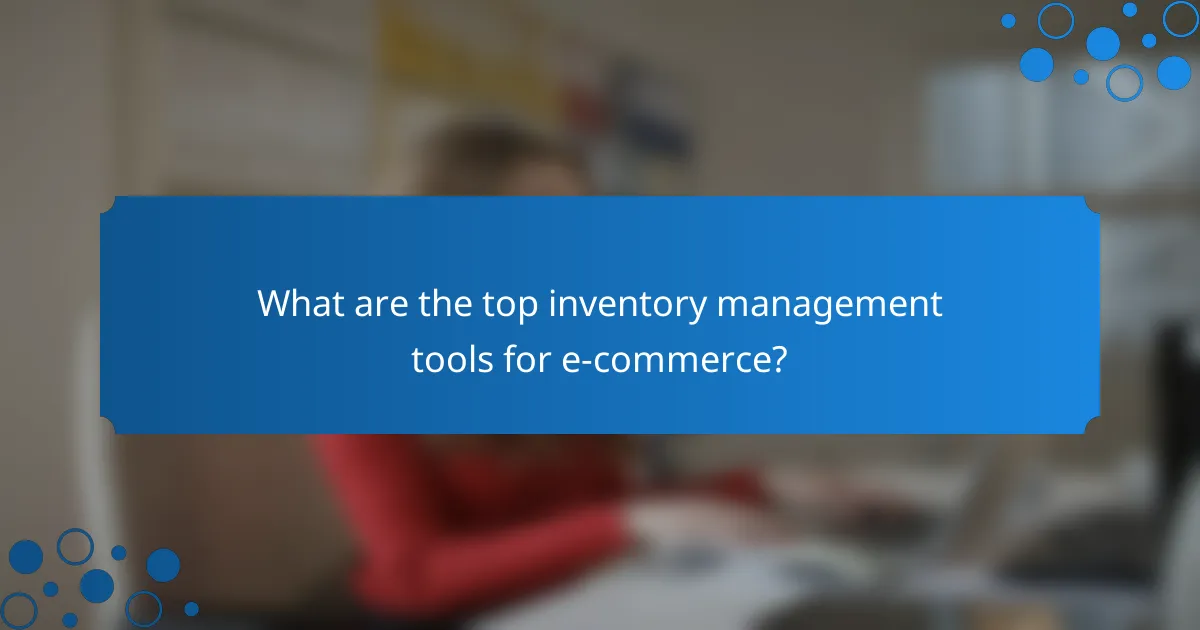
What are the top inventory management tools for e-commerce?
The top inventory management tools for e-commerce streamline stock control, order processing, and reporting. These solutions help businesses maintain optimal inventory levels, reduce costs, and improve customer satisfaction.
TradeGecko
TradeGecko, now known as QuickBooks Commerce, is designed for small to medium-sized businesses. It offers features like real-time inventory tracking, order management, and integration with various e-commerce platforms.
With TradeGecko, users can automate stock updates, manage multiple sales channels, and generate insightful reports. This tool is particularly beneficial for businesses looking to enhance their operational efficiency.
DEAR Inventory
DEAR Inventory is a comprehensive solution that caters to various industries, including e-commerce. It provides advanced inventory management features such as batch tracking, serial number tracking, and multi-location management.
This tool integrates seamlessly with popular e-commerce platforms and accounting software, making it easier for businesses to synchronize their operations. DEAR Inventory is ideal for companies that require detailed tracking and reporting capabilities.
Zoho Inventory
Zoho Inventory is a cloud-based inventory management tool suitable for small businesses. It offers features like order fulfillment, inventory tracking, and integration with Zoho’s suite of applications.
With a user-friendly interface, Zoho Inventory allows businesses to manage stock levels efficiently and automate order processing. It is a cost-effective solution for those looking to optimize their inventory management without extensive investment.
Skubana
Skubana is an all-in-one operations platform that combines inventory management with order processing and analytics. It is geared towards larger e-commerce businesses that need to manage complex supply chains.
This tool provides features such as demand forecasting, automated purchasing, and multi-channel selling. Skubana is particularly useful for businesses looking to scale and streamline their operations across various sales channels.
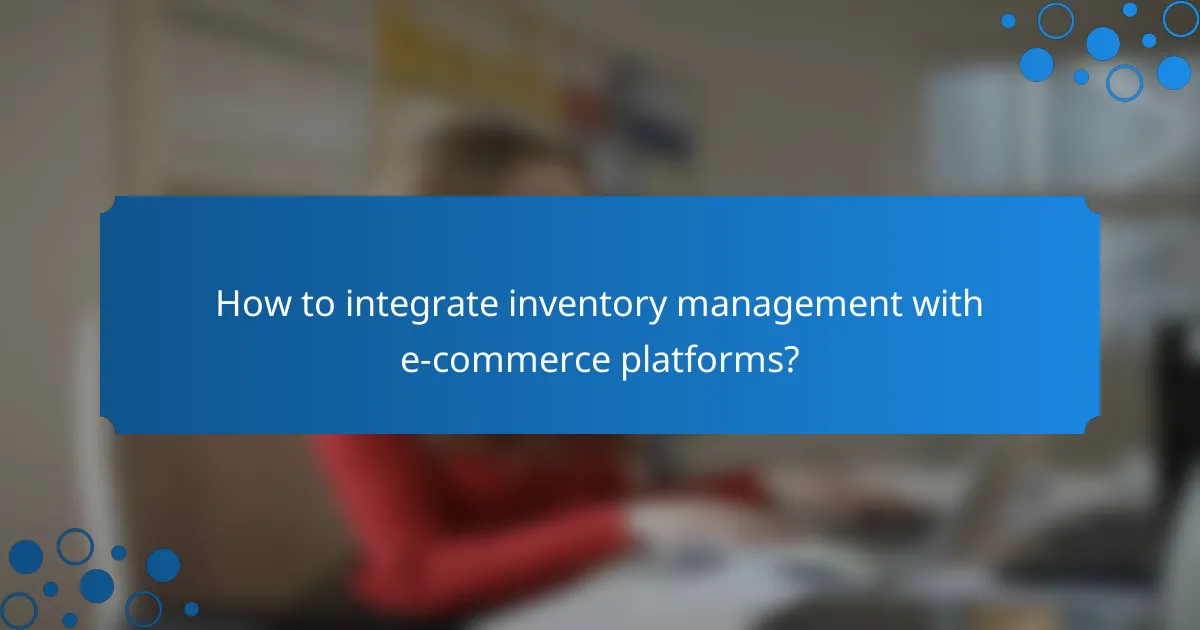
How to integrate inventory management with e-commerce platforms?
Integrating inventory management with e-commerce platforms streamlines operations by synchronizing stock levels, reducing errors, and improving customer satisfaction. This integration ensures that product availability is accurately reflected across all sales channels, which is crucial for maintaining a competitive edge.
API connections
API connections allow e-commerce platforms to communicate directly with inventory management systems. This integration enables real-time updates on stock levels, order processing, and product information, ensuring that both systems reflect the same data. When setting up API connections, consider the compatibility of your e-commerce platform with your inventory management software.
To implement API connections effectively, ensure you have a clear understanding of the API documentation provided by both systems. Testing the connection in a controlled environment can help identify any issues before going live, minimizing disruptions to your business operations.
Third-party integrations
Third-party integrations offer pre-built solutions that connect e-commerce platforms with various inventory management tools. These integrations can simplify the setup process and often come with user-friendly interfaces, making them accessible even for those with limited technical expertise. Popular third-party solutions include platforms like Shopify, WooCommerce, and BigCommerce.
When choosing a third-party integration, evaluate the costs involved, including subscription fees and transaction charges. Additionally, consider the level of support provided by the integration service, as reliable customer support can be invaluable during setup and troubleshooting.
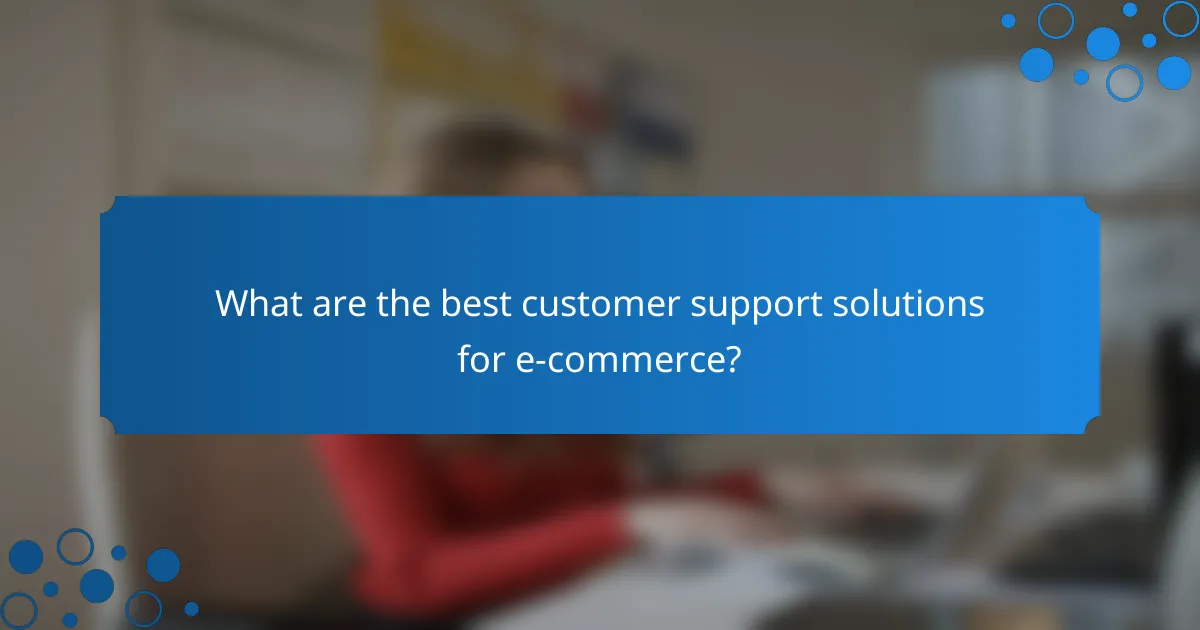
What are the best customer support solutions for e-commerce?
The best customer support solutions for e-commerce streamline communication, enhance customer satisfaction, and improve operational efficiency. Key platforms include Zendesk, Freshdesk, Intercom, and Gorgias, each offering unique features tailored to online businesses.
Zendesk
Zendesk is a widely used customer support platform that provides a comprehensive suite of tools for managing customer inquiries. It offers features like ticketing systems, live chat, and a knowledge base, making it suitable for businesses of various sizes.
One of its strengths is the ability to integrate with numerous third-party applications, allowing for a customized support experience. Pricing typically starts at around $5 per agent per month, scaling with additional features and capabilities.
Freshdesk
Freshdesk is another popular choice, known for its user-friendly interface and robust functionality. It includes ticket management, automation tools, and multi-channel support, enabling businesses to engage customers through email, chat, and social media.
Freshdesk offers a free tier for small teams, with paid plans starting at approximately $15 per agent per month. This makes it an attractive option for startups and growing e-commerce businesses.
Intercom
Intercom focuses on conversational support, providing tools for live chat, chatbots, and customer engagement. Its platform is designed to facilitate real-time communication, helping businesses respond quickly to customer needs.
Intercom’s pricing is based on the number of active users and features, making it flexible but potentially costly for larger teams. It’s particularly beneficial for companies looking to enhance customer interaction and retention.
Gorgias
Gorgias is tailored specifically for e-commerce, integrating seamlessly with platforms like Shopify and Magento. It centralizes customer interactions from various channels, allowing support teams to respond efficiently.
With features like automated responses and a focus on order management, Gorgias helps e-commerce businesses streamline their support processes. Pricing starts at around $60 per month, making it a viable option for dedicated online retailers.
